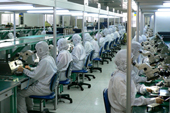How To Make the Chinese Supply Chain Safer
Multinational companies such as Apple need to give their Chinese suppliers better incentives to comply with local standards in environmental and health safety, say researchers from Stanford in the new issue of MIT SMR.

Multinational firms need to incentivize Chinese suppliers to look for and disclose manufacturing deficiencies themselves, say the authors of a new MIT SMR article.
Are multinational companies giving their Chinese suppliers the incentives necessary to comply with standards in environmental and health safety?
In the new Winter issue of MIT Sloan Management Review, authors Erica Plambeck, Hau L. Lee and Pamela Yatsko explore this question in “Improving Environmental Performance in Your Chinese Supply Chain.”
“Given how much of the world’s manufacturing takes place in China and the damage it has wrought on that country’s environment,” starts the article, “most analysts expect that multinational brands’ supply chains will face increasing scrutiny in the coming years.”
And how. Today’s New York Times, for instance, has a 5,207-word investigative piece about manufacturing conditions in Apple’s Chinese supply chain. “In China, Human Costs Are Built Into an iPad,” by Charles Duhigg and David Barboza, is based, the authors say, on “interviews with more than three dozen current or former employees and contractors, including a half-dozen current or former executives with firsthand knowledge of Apple’s supplier responsibility group, as well as others within the technology industry.”
The Times authors write that the Chinese workers assembling iPhones and iPads “work excessive overtime, in some cases seven days a week, and live in crowded dorms. Some say they stand so long that their legs swell until they can hardly walk. Under-age workers have helped build Apple’s products, and the company’s suppliers have improperly disposed of hazardous waste and falsified records, according to company reports and advocacy groups that, within China, are often considered reliable, independent monitors.” As well, “Two years ago, 137 workers at an Apple supplier in eastern China were injured after they were ordered to use a poisonous chemical to clean iPhone screens. Within seven months last year, two explosions at iPad factories, including in Chengdu, killed four people and injured 77.”
Apple has a supplier code of conduct and issued a 2012 progress report about “efforts to improve worker protections and factory conditions” (see both at apple.com/supplierresponsibility).
